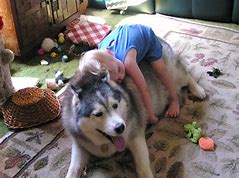Nine Useful Traits My Dogs Taught Me About Moving and Living Abroad
.png) Who among us hasn’t been cheered during an otherwise down time or learned an important life lesson from a dog?
Who among us hasn’t been cheered during an otherwise down time or learned an important life lesson from a dog?About 20 years ago, when I was having a difficult time in a particularly tense business negotiation, I stopped for a moment and happened to look away from my computer screen and phone and towards the floor. There, with new eyes, I saw Cookie, the family dog, fast asleep near my desk, as usual, her complete contentment and lack of concern in sharp contrast to my anxiety.
In a flash, it occurred to me: I don’t have the right idea; Cookie has the right idea. Whatever happened with my negotiation, Cookie could be happy pretty much anywhere, and her very high opinion of me wouldn’t change depending on the success or failure of my present, high stakes business call.
I mentioned this to my daughter who was about eight at the time. She must have remembered it, because about ten years later, she presented me with a plaque that summed it up perfectly:
“Lord, help me to be the person my dog thinks I am.”
 To this I would add: “And help us to take on some of the traits of our loyal dog companions.”
To this I would add: “And help us to take on some of the traits of our loyal dog companions.”We can learn a lot from dogs.
Now that I’ve read more than 9,500 answers about moving and living abroad, read more than 300 expat stories, and lived abroad for more than two years myself, I’ve learned a lot about what it takes to be successful.
And quite a lot of what I learned I can see just by watching and learning from how our dogs responded to the move.
In case you don’t have one or more dogs (we now have three, thanks to one who recently adopted us), or you may like a guide as to what to look for in your dog(s) behavior that you can use in your move abroad, here’s our list of the nine things our dogs could teach us about moving abroad.
1. Don’t sweat the little things.
Us: When we humans are under stress, it’s easy to act in the moment as if a particular problem or issue is more important than it would appear to us if we were more relaxed. As an example, you just hit a tope (speed bump) going 50 miles an hour in Mexico, or
.jpg) the guy who is supposed to install your Internet in Panama doesn’t show (again). Things won’t go perfectly when you live abroad, especially at the beginning.
the guy who is supposed to install your Internet in Panama doesn’t show (again). Things won’t go perfectly when you live abroad, especially at the beginning. Our dogs: Call it perspective or something else, but our dogs just seem to not get too worked up over much of anything. From time to time (but rarely) you may see a dog that’s agitated, but if it is, there is usually a very good reason. And even then, how long does it last? About as long as it takes to give them almost any attention and care at all, or perhaps some small treat. When you feel under stress, give yourself some attention or a small treat. You’ll feel better.
2. Any time you can, play like you’re a puppy. When you can’t, take a nap.
Us: Filled with self-importance and our perceived serious and potentially world-altering nature of our personal situation, we can tend lose the lightness and just plain fun we experienced more when we were younger. As an example, consider the typical grown-up human response driving south of Cordoba in Mexico, with our van smashing into crater-sized potholes large enough to propel our dogs not only side-to-side, but at times, airborne as well. As humans, our response typically wouldn’t be pretty (or pleasant).
.jpg)
Our dogs: Whatever their age, if their health permits it, dogs will want to play, at times becoming quite inventive. Dogs are always looking for a way to make a game out of almost anything they can find. An old tennis ball becomes a thing to fetch; a discarded rope becomes a pull toy. We don’t see a lot of grim, cheerless, dreary, forlorn, dismal, or overly earnest dogs who don’t like to play.
What did our dogs do when we hit those potholes? Not only were they not worried, but they had a great time. You should have seen the happy looks on their faces. Your problems and the potholes will be there for you regardless of your attitude, so you might as well have a good one. When dogs play, they go all out. And when they’re not playing, you’ll see them taking a nap. Not a bad strategy.
3. Have patience.
Us: When we’re confronted with new challenges, such as bringing emus, peacocks, goats, pot-bellied pigs, (not to mention several children) with you to Belize like Macarena Rose or trying to get a health clinic up and running in rural Nicaragua like Mike Cobb, if things don’t go our way pretty much right away, we will tend to get frustrated, which not only is not enjoyable for us, but will so aggravate others that t
.jpg) hey will tend to be less likely to help us, thereby further lessening our prospects for success. At times, having patience may not be that easy, for example, when you’re standing in line at the immigration office in Belize for an hour and then they decide to take lunch and close the line. Yelling at the officers usually doesn’t help your cause and may actually hurt it. It is better to bring a book.
hey will tend to be less likely to help us, thereby further lessening our prospects for success. At times, having patience may not be that easy, for example, when you’re standing in line at the immigration office in Belize for an hour and then they decide to take lunch and close the line. Yelling at the officers usually doesn’t help your cause and may actually hurt it. It is better to bring a book. Our dogs: When confronted with new challenges, such as hunting for a squirrel that got away a dozen times before, dogs can not only be quite strategic, but also extremely patient. I have seen one of our dogs sit virtually motionless and wait for her opportunity to catch that squirel for an hour or so, and then, if not successful, come back a few hours later or the next day and wait again, in exactly the same spot. Eventually and regularly, she succeeds, but she never would if she weren’t calm… and patient, like we can be at that immigration office (and get to read a good book, too).
4. Take advantage of every opportunity to experience new things— and don’t be afraid to look silly.
Us: Too often, we interpret “different” or “new” as “scary,” and our mind tells us to back away. This is a shame, because there are plenty of different and new possibilities to experience when living abroad. Also contributing to our human tendency not to do new things (especially in public) is our fear of looking silly. Living abroad gives you the opportunity to see and do and participate in so many new things, some of which we may not have the chance to do again. Did you join the drummers in Belize
.jpg) or the parade in San Miguel de Allende, or get a haircut for less than US $3 in a rural Mexican village, just to see how it turned out? What would have been the worst thing that could have happened if you did?
or the parade in San Miguel de Allende, or get a haircut for less than US $3 in a rural Mexican village, just to see how it turned out? What would have been the worst thing that could have happened if you did? Our dogs: Within seconds of our dogs seeing the gorgeous, clear and calm waters off Baja in the Sea of Cortez, they jumped in. They also took the water slide at the pool right next to the beach. (Very funny video, including the waiter's reaction.) Think about it. Have you ever seen a self-conscious dog? Then consider this: Has being self-conscious helped you in your life? And how much more will being afraid of looking silly help you as you have more and different experiences to participate in during your life abroad? As Mark Twain said: “Twenty years from now, you will be more disappointed by the things you didn't do than by the ones you did do.” Dogs (who typically don’t even live 20 years) seem to know this intuitively. Dogs participate.
5. Take a walk or go for a ride in the car. Get outside and explore your surroundings often.
Us: We humans can find all sorts of excuses for not leaving the house: it’s too hot / too cold, we’re tired, it might rain, there’s a sit-com on TV we like, our hip hurts, we’re too old, etc., etc., etc.
.jpg)
Our dogs: None of these excuses apply to dogs. How often have you seen a dog who didn’t want to explore outside of their house? Just us humans getting the leash, putting on our shoes or getting our keys is many times enough to work our dogs into a frenzy of excitement. In places like Mexico, Panama, Belize and Nicaragua, when they’re not taking a nap, you see dogs walking around all the time, many times with their dog friends. Expanding our world by experiencing new things and people and just being part of life outside our homes is one of the reasons we moved abroad in the first place, right?
6. Try to meet and make friends with everyone.
Us: Us humans tend to limit our social circle to those “like us.” This is a big mistake, especially when living abroad, when we tend to have so many more opportunities to experience the fullness of interactions with a wider variety of people, some of whom we never would have met if we had not moved abroad. Given an open mind and the proper attitude, you’ll be amazed at the friendships you will begin and enjoy, with people well outside the more constrained circle of friends you would have if
.jpg) you hadn’t moved abroad. In the end, this may be one of your most cherished benefits of moving abroad.
you hadn’t moved abroad. In the end, this may be one of your most cherished benefits of moving abroad. Our dogs: Whenever a normal, happy dog, especially off leash, meets other dogs or other people, that dog is usually very interested in meeting and saying “hello” to pretty much every living creature. Labs mix with Dobermans, Chihuahuas mix with Bull Mastiffs and Great Danes, German Shepherds with Yorkshire Terriers. A fluffy Poodle with pink bows in his fur just back from the groomer will play with a street dog as if they’ve been best friends forever. A dog will “acknowledge everyone in the room,” which is a wonderful trait and one especially worth emulating. After going on a hike with a bunch of new people and before going our separate ways, my dog Cookie went separately to each person to say goodbye and make friends. It was amazing to watch. Everyone loved Cookie and everyone left with good feelings in general. Thanks, Cookie!
7. Practice gratitude and give thanks often.
Us: After we’ve gotten what we want, it is a human trait to take what we have for granted. One of the advantages of living abroad is that, for most of us, we get to see those who have less than us on a very regular basis. If we’re centered, we understand that our gifts were largely unearned, meaning
.jpg) that we could just as easily been that less fortunate person walking along the side of the road you just drove by on your way to the beach in Panama.
that we could just as easily been that less fortunate person walking along the side of the road you just drove by on your way to the beach in Panama. Our dogs: Have you ever seen an ungrateful dog? Whatever we do for them, they show us in so many different ways that they appreciate us. Displaying gratitude makes us humans feel better and happier, and it feels really nice to the person you thanked, too. (Just see how happy people are to be around a dog who is jumping up and down in joy to see them.)
8. Focus on the right things and get over disappointments quickly.
 Us: As humans, we tend to focus on problems and past events that didn’t go our way and we tend to obsess on them as they fester from us thinking about them too much.
Us: As humans, we tend to focus on problems and past events that didn’t go our way and we tend to obsess on them as they fester from us thinking about them too much. Our dogs: If a dog loses a favorite toy or some other dog gets a larger treat than it did, a few moments later, it’s like nothing happened at all. Dogs don’t hold grudges like we do and they don’t hold on to past hurts. As soon as their lives improve in any way at all, they’re back to being happy, just like nothing happened. I suspect that this comes naturally to dogs, while us humans have to practice.
9. We’re not here forever (even less time for a dog), so make the most of it.
This brings us an
 overalll lesson gained from watching and learning from my dogs, and it is one that we learn many times when it is too late. Given that the average dog lives but a fifth as long as we do, many times we can be with them from when they were puppies, all the way to the end. Will your dog have made the most of its dog life; living, enjoying, playing, making friends, participating, showing gratitude, loving and being loved as much as possible in its life? More than likely, the answer is “Yes.” With that extra 65 years we’re given, can we say the same for us, ?
overalll lesson gained from watching and learning from my dogs, and it is one that we learn many times when it is too late. Given that the average dog lives but a fifth as long as we do, many times we can be with them from when they were puppies, all the way to the end. Will your dog have made the most of its dog life; living, enjoying, playing, making friends, participating, showing gratitude, loving and being loved as much as possible in its life? More than likely, the answer is “Yes.” With that extra 65 years we’re given, can we say the same for us, ?Like I said, we can learn a lot from our dogs.

Important author’s note: There is no doubt that, in general, dogs are treated much better in the US and Canada than in Mexico, Panama, Belize and Nicaragua, and of course, abused dogs are not the kind of happy, well-adjusted dogs I describe in this article. There are many groups organized to help these dogs, and we urge you to support these groups in any way possible. They do wonderful work.
If you’re interested in taking your dogs abroad, you may enjoy our video on the subject or reading answers about bringing pets abroad.
And be sure to check out our free eBooks and studies about expat life in Mexico, Panama, Belize and Nicaragua here.
And be sure to check out our free eBooks and studies about expat life in Mexico, Panama, Belize and Nicaragua here.
To see hundreds of questions answered by expats already living in Mexico, Panama, Belize, Nicaragua and Portugal, go here and navigate to the place you're most interested in.
Sign up for the Best Places in the World to Retire newsletter. To see additional additional pictures and videos not in the stories, follow us on Facebook. To see more videos of the trip, see our YouTube channel.
Want online, interactive help finding the best place abroad for you? Try the Location Advisor.
To download free research studies conducted with over 1,000 expats (many with their dogs) currently living in Mexico, Panama, Belize or Nicaragua, click here.



.png)